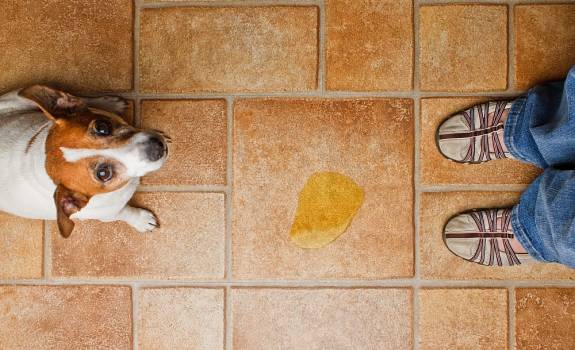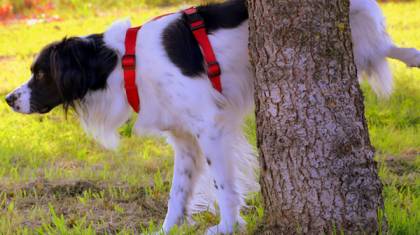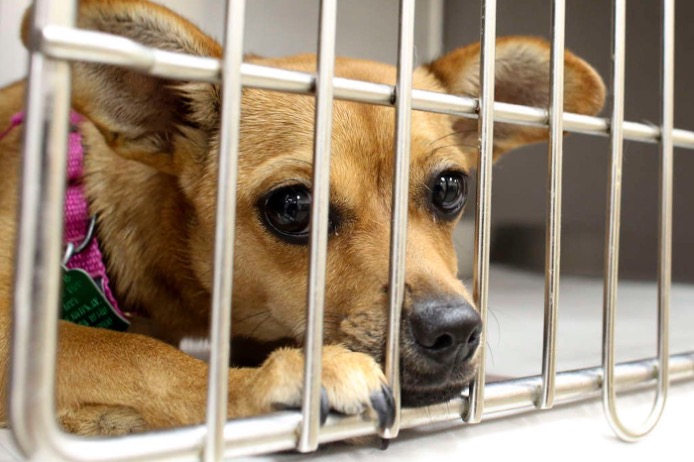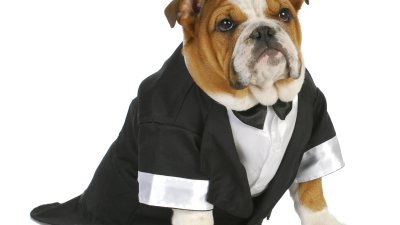Connect with a verified veterinarian in minutes. Licensed vets are available 24/7 to answer your questions. No need to worry about your furry family member.
Older dogs can suffer from some of the same health issues we do, when reaching their senior years. This can even include problems with incontinence. If your dog has developed this problem, don’t lose hope or patience. Remember it’s not your dog’s faut. It’s a matter of aging and there are things your vet may be able to suggest or medications to prescribe that can help your dog.
In this article, we’ll take a look at old dog incontinence, what causes it, and more. Let’s get started!
What is Incontinence?
Incontinence happens when a dog develops the inability to control their bladder and bowels. Your dog may be going potty near the door or just perhaps not far from where he sleeps. This is because he simply isn’t able to “hang on” any longer and has to go. It’s also possible for a dog to go potty without even realizing it.
Older dogs who have become incontinent may feel very embarrassed, ashamed, and more. They may also fear being disciplined. However, they can’t help this problem. Incontinence can be a part of a dog’s getting older.
Dogs of both sexes can experience incontinence; however, this is a problem most often seen in girl dogs. This is because they more easily lose control of the muscle (sphincter) that keeps the bladder closed. When this happens, urine can easily leak out, or your dog can have a potty accident. The condition is called sphincter mechanism incontinence.
Symptoms of Incontinence in Older Dogs
You may notice that your dog has developed an incontinence problem if you notice these symptoms:
- Your fur baby has a bowel movement while sleeping
- Dribbling urine while walking or standing
- Urine leaking while sleeping
- Dropping poo while walking/standing
- You may find wet spots on bedding or in places where your dog has slept
- Your dog may have a strong odor of feces and/or urine
- Your dog’s legs may be damp
- Skin may be irritated where its constantly in contact with urine
- Your dog may lick their backend to relieve any irritation from the urine and feces
At first, your dog may appear as if he can’t hold it. In that case, you want to try letting him out more often to go potty.

Review symptoms, medications & behavior to keep your pets healthy with a Vet Online in just minutes.
Ask a Vet Live NowOther Causes of Incontinence
While your older dog may be having potty accidents, these could be caused by an underlying health issue rather than incontinence caused by your dog’s age. Other conditions that may cause incontinence include:
Urinary tract infections: this is a very common cause of potty issues in dogs. The infection may be treated with antibiotics, which may help end the potty accidents. What’s more, the problem could also be caused by tumors or bladder stones.
Gastrointestinal disorders: these types of issues can cause diarrhea and poo problems that may resemble incontinence. This is an issue that needs your vet’s attention. They may run x-rays or an ultrasound to check your dog’s bowels.
Kidney disease: is another common health problem in older dogs. When a dog has kidney disease, he may drink more water than normal. This can lead him to urinate more often, which can be challenging for older dogs.
Spinal problems: can involve damage to nerves that can lead to incontinence. This is a common problem in dogs who have intervertebral disc disease (IDD) or dogs who have spinal injuries.
Arthritis: is also common in senior dogs and can make it more challenging for a dog to get around. Because the dog’s joints are stiff and sore, this can make it more difficult for your dog to get up and around in time to get outside before going potty. He simply can’t hold it any longer.
Brain disease: dogs can develop brain disease that causes them to become incontinent. Another problem is the development of doggie dementia, which is more common in senior dogs. These conditions may cause a dog to forget where to go potty, focus, and more. You may notice your dog has become more anxious and disoriented. Incontinence is one of the earliest signs of dementia in dogs.
Fluctuating hormone levels: just like humans, our fur babies can experience changing hormone levels as they age. Old dog incontinence can sometimes be caused by a hormone imbalance. This means female dogs may not have enough estrogen, while male dogs may lack testosterone.
As you can see, with so many causes of doggie incontinence, it’s important to take your dog to the vet for a checkup. With the right treatment, your dog could regain the ability to hold it longer, stop having potty accidents.
It just depends on the cause of the problem. The vet can make the right diagnosis and then determine the best treatment for your older dog.
Treatment for Old Dog Incontinence
After the vet makes a diagnosis, they will prescribe the right medications and/or supplements that can help cure your dog’s incontinence problem. However, do keep in mind there’s no treatment for doggie dementia. And in some cases, there may also be no treatment for your dog’s incontinence. In that case, the vet may make some other suggestions:
- Take your dog out to go potty more often. This may include taking him out right after eating, drinking, and when he first wakes up.
- Clean potty areas thoroughly with an enzymatic cleaner. The cleaner will keep your dog from going to the same place every time.
- Use puppy training pads in locations that are easy for your dog to reach.
- Use waterproof coverings on the dog’s bed and other places he likes to sleep.
- Use doggie diapers; however, remember these need to be changed often. Otherwise, your dog could develop skin infections and irritation.
- Wash your dog’s genital area more often to keep smells down to a minimum. It will also help keep your dog’s skin from becoming irritated and infected.
Always remember that your dog may not have control of his bladder or bowels due to getting older. Scolding your dog harshly for potty accidents may only make the problem worse. It will cause him to become more anxious and ashamed.
If your dog has developed incontinence issues, then be sure to get him checked by the vet. The problem could be caused by an underlying health issue or old age. Either way, the vet will have the guidance and advice you need to help your dog in his senior years.
Connect with a verified veterinarian in minutes. Licensed vets are available 24/7 to answer your questions. No need to worry about your furry family member.

Kim
Kim is a talented author, who loves animals especially dogs. She engaged in writing books and articles relating to animals a decade ago. Kim resides in Chicago with her husband and son. The family is the proud owner of a dog and a parrot (Jack and Lily). Kim wanted more than these two pets, but her husband put his foot down... She often visits elementary schools to talk to the kids about what she learned about pets and how they could learn from them.
Review symptoms, medications & behavior to keep your pets healthy with a Vet Online in just minutes.
Ask a Vet Live Now




